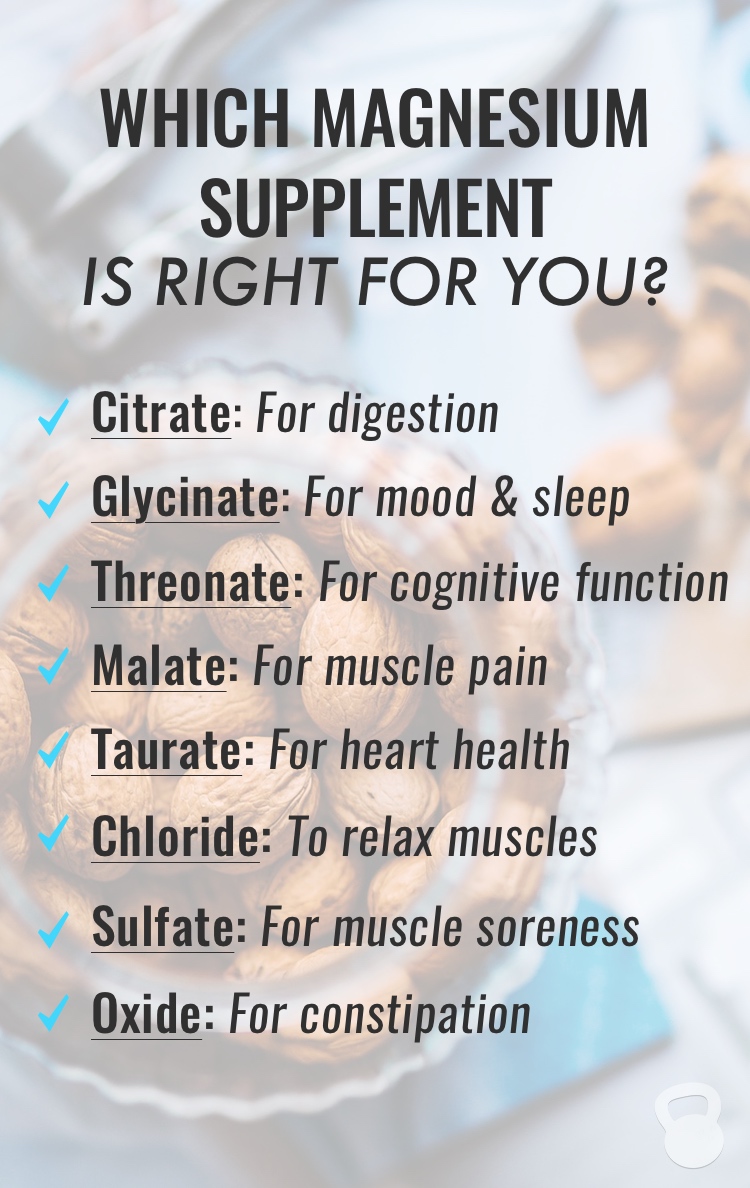This post may contain affiliate links. Please read our disclosure policy.
Magnesium supplementation can be confusing and overwhelming. Here’s a comprehensive guide to the different types of magnesium, and how to figure out which one is right for you.

If you’ve been hearing a lot about magnesium lately, it’s for good reason. Research suggests up to two-thirds of Americans are deficient in magnesium. As a result, the majority of people can benefit from supplementing with the right type of magnesium.
Magnesium is the fourth most abundant mineral in your body and the catalyst for over 600 chemical reactions. It plays a role in detoxification, digestion, energy production, stress management, and even your heart rhythm!
When you’re deficient in magnesium, you can experience a wide variety of negative symptoms, including leg cramps, insomnia, fatigue, anxiety, diabetes, migraines, and heart problems. Magnesium deficiency also plays a role in hormone imbalances and PMS symptoms. Low serum magnesium concentrations are even linked to higher rates of mortality.
Magnesium supplementation is incredibly important because your body can’t make it or store it. But, this is where things get confusing. Most people start looking for a quality magnesium supplement only to find there are many different types. If you’re wondering about the benefits of each type and which one is right for you—you’re in the right place!
Jump to:
Why Do You Need a Magnesium Supplement?
Magnesium is predominantly found in leafy greens, nuts, avocados, and chocolate. But, soil degradation has dramatically decreased the nutrient density of food. Even if you’re eating plenty of spinach and pumpkin seeds, you’d still likely be low in magnesium. This was the case for me. On routine blood tests, my magnesium was always low despite eating leafy greens daily.
Another thing that impacts your magnesium levels is your body’s demand for it. Stress, caffeine, and pregnancy deplete magnesium stores. As you might have guessed, this means women are much more prone to magnesium deficiency.
As a final hit, research shows only 30% to 40% of the dietary magnesium you consume is actually absorbed in your body. So, even if you track your magnesium intake, you are only absorbing about half of that.
Choosing a Quality Magnesium Supplement
Quality matters when it comes to magnesium supplements. It’s important to choose a magnesium that supplies your body with sufficient magnesium in an easily absorbable form.
Magnesium is a chemically active element, which means it reacts strongly and quickly with other elements. Due to reactivity, it must be linked to another element to form a compound.
The bioavailability (aka absorption) of a specific type of magnesium depends on what it is bound to. This is why the type of magnesium you take matters!
Studies consistently show inorganic salts of magnesium are harder for the body to absorb. These include magnesium oxide, magnesium sulfate, and magnesium chloride. When magnesium is bound to an organic substance, like magnesium glycinate, the magnesium gets carried into cells, resulting in higher digestibility and absorption of magnesium.
The best way to make sure you are supplementing with magnesium that is bioavailable is to take a chelated magnesium supplement. When elemental magnesium is chelated, it is bound to a carrier by two or more points of attachment. This makes it more stable and better absorbed by the body.
Which Type is Right for You?
There are three important things to consider when evaluating which type is best for you:
- Is it a bioavailable and easy for your body to absorb?
- Is it a type of magnesium that is right for you and your body’s needs?
- Does it irritate the intestines?
The forms of magnesium that irritate the intestines are typically less bioavailable because the magnesium that you’re taking draws water to it, and ends up in the toilet. If you need to take magnesium for constipation, I recommend taking a small dose, then taking another form of magnesium that is better absorbed so you are actually getting magnesium into cells.
I personally take magnesium lysinate glycinate, as it’s bound to both lysine and glycine. It has a 90% absorption rate and helps to improve, sleep, mood, and bring calmness. I recommend this for most people as it provides the benefits most people need. You could also try taking 100 mg of one type, and 100 – 200 mg of another type to see how your body responds.
How Much Magnesium Should You Take?
The National Institute of Health puts the RDA for adults over 31 at 420 mg for males and 310 mg for females (or 350 mg for pregnant females). Recommended doses are between 200 – 400 mg.
In general, you do not want to rely on a multivitamin for your magnesium. The type will likely be less bioavailable and in too small of a dose.
Always choose a magnesium supplement that does not include additives such as dyes, sugar, unnecessary preservatives, artificial colors or allergens. Find a company that provides proof of how they source and process their ingredients, and make sure you’re buying your supplements from a trusted retailer.
Also, keep in mind that the dose you see on the label is different from what’s actually being absorbed. For example, if you’re taking magnesium oxide, studies suggest it only has a 4% absorbability rate. This means that if you are taking 500 mg of magnesium oxide, you may actually be only absorbing less than 50 mg of that.
In contrast, you could take magnesium lysinate glycinate, which has a 90% absorbability. This means and need much less because more is getting into cells.
8 Different Types of Magnesium and Benefits
There are eight common types of magnesium. Each has their own benefits, absorption rate, and disadvantages. Because of this, you may notice different effects depending on the supplement you choose to take.
Want to take the most absorbable form? Try magnesium lysinate glycinate, which has a 90% absorbability and helps with sleep, mood, and calmness.
1. For digestion: Magnesium citrate
Magnesium citrate is one of the most researched types of magnesium. It’s typically recommended to for digestion support because it draws water to it and relieves constipation. It is bound to manufactured citric acid. As a word of caution, this one has a laxative effect. Start with a smaller dose, and then adjust as needed. If it’s too much for you, taper it back down.
Looking for a recommendation? Try Natural Calm.
2. For mood and sleep: Magnesium glycinate or Magnesium lysinate glycinate
Magnesium glycinate (or magnesium biglycinate) is bound to the amino acid glycine. Another fairly new form, known as magnesium lysinate glysinate, is bound to both glycine and lysine. It has the highest absorbability rate at 90%. Both forms are chelated and improve sleep, stress, mood, and bring a sense of calm. Daily magnesium glycinate intake has been show to provide “rapid recovery” from mood disorders like depression. It does not irritate the intestines.
Looking for a recommendation? Try Well Minerals Magnesium Lysinate Glycinate.
3. For cognitive function: Magnesium L-threonate
Magnesium L-threonate is bioavailable and one of the only types that can pass the blood brain barrier. Preliminary research suggests regular supplementation with magnesium L-threonate can improve overall cognitive function, memory, and prevent dementia.
Looking for a recommendation? Try Magnesium Nightcap.
4. For fibromyalgia and muscle pain: Magnesium malate
Magnesium malate is formed by combining magnesium with malic acid. Studies show supplementation with magnesium malate can improve muscle tenderness and pain associated with fibromyalgia. Preliminary research also suggests magnesium malate is more bioavailable than other magnesium compounds.
Looking for recommendations? Try Source Naturals Magnesium Malate.
5. For heart health: Magnesium taurate
Magnesium taurate is bound to the amino acid taurine, which is known for its ability to lower blood pressure and protect heart muscle cells. Because magnesium is also know for its heart-protective properties, preliminary research suggests magnesium taurate may have considerable potential as a vascular-protective nutritional supplement. Also, it may be used to treat acute heart attacks and pre-eclampsia.
Unfortunately, there has been little to no research on the bioavailability of magnesium taurate or its effectiveness in improving heart health. Because of this, I recommend sticking with a magnesium combo supplement that contains magnesium taurate or choosing other bioavailable forms of magnesium.
Looking for a recommendation? Try Source Naturals Ultra-Mag Hi Efficiency Magnesium.
6. For stress and to relax muscles: Magnesium chloride
Magnesium can be absorbed transdermally (through your skin), so topical application is a great option for muscle relaxation. Try using magnesium chloride bath flakes for stress relief, muscle recovery, and joint pain. You can also try magnesium oil products.
Note: Transdermal application is not a proven form of increasing magnesium levels in the body, so you need to take it orally if you want to increase your magnesium.
Looking for a recommendation? Try Ancient Minerals Bath Flakes and Magnesium Oil Spray.
7. For muscle soreness: Magnesium sulfate
Have you ever taken an epsom salt bath? That’s actually magnesium sulfate. It’s fantastic for joint pain, relaxation, and muscle soreness. For athletes, this is an excellent source of magnesium.
Looking for a recommendation? Try Epsoak USP Epsom Salt.
8. For constipation: Magnesium Oxide
Magnesium oxide has much lower levels of bioavailability when compared to other types. Studies show it has an absorbability as low as 4%. In general, it’s a terrible option if you’re looking to raise magnesium levels in the body. So, what’s it good for? Treating constipation. Magnesium oxide is the active ingredient in milk of magnesia, which has a laxative effective.
Check your labels! If your magnesium is buffered with magnesium oxide, find a different type.
The Best Type of Magnesium For You
While eight may seem like a lot, there are actually other forms of magnesium on the market, including magnesium orotate and magnesium aspartate. If you don’t see it in the list above, it’s because there is little to no scientific research on bioavailability or safety. Stick with the list above, experiment, and you’ll likely find one that works for you.
If a certain type doesn’t seem to be working for you, give a different one a try. Prioritize forms that are more bioavailable, and consider getting your magnesium levels tested after regular supplementation to see if your magnesium levels are sufficient.
Additional Resources






Melinda says
This is so helpful! Thank you for the information!
Jessica says
Thanks for this info. Very helpful. For sleep and mood, when do you take it?
Noelle Tarr, NTP, CPT says
At night before bed!
Theresa says
What supplement would you take if you have all of those symptoms except constipation
Noelle Tarr, NTP, CPT says
Take a compound supplement, like magnesium breakthrough.
Stephanie says
If you’re using a topical magnesium supplement for stress reduction and improved sleep, such as the Ancient Minerals Magnesium Gel, how much should you use and does it matter where you apply it? Would it be better to use a capsule form instead? I fast at night (after 7pm), so I would prefer to use a topical form to ensure I do not break my fast.
Noelle Tarr, NTP, CPT says
Definitely OK to use topical forms. I actually found topical forms served me much better when I was pregnant. Ancient minerals has information on their website about how much magnesium is in specific measurements. For example, 6 sprays contains 100mg magnesium. The biggest factor in figuring out what works for you is trying it, and seeing if your symptoms improve!
Hanna says
Thank you for this information! I’ve always taken magnesium supplements, but now I’m questioning whether I am taking the right one. I am currently breastfeeding my daughter, do you recommend magnesium citrate because it is most bioavailable? Thank you in advance.
Noelle Tarr, NTP, CPT says
I recommend all of the ones above that I’ve noted are bioavailable! 🙂 Go off of symptoms you’d like to resolve.
Michelle says
This is great information, thank you! Is it safe to take multiple forms of magnesium daily for different symptoms? Can you take too much?
Noelle Tarr, NTP, CPT says
Yes, you can take different types! It really all depends on your individual need.
Kodi says
How do you know what your body lacks. Everybody different
Noelle Tarr, NTP, CPT says
Hi Kodi! I find assessing symptoms helps, but if you’re unsure, just take a compound supplement with multiple different types.
Christine says
Hi! My mom suffers from restless leg syndrome. Your list has a few options for muscle issues so which one do you recommend she take? Thank you! Very informative article!
Noelle Tarr, NTP, CPT says
I would actually start with using a magnesium oil directly on her legs. Also, a combo supplement like Magnesium Breakthrough is a great place to start.
Jenn says
Hello! Which one is the best for migraine prevention? And how much usually? Thanks!
Noelle Tarr, NTP, CPT says
Hi Jenn! I posted RDAs above. I would recommend glycinate or threonate.
Pam M says
Why did you not mention Chelated Magnesium? I’ve been using it at night ,helps me to get to sleep! I was told it breaks down easier.
Noelle Tarr, NTP, CPT says
Chelated magnesium isn’t a type, it’s a way it’s bonded so that it’s absorbed. I explain chelated magnesium in the post above!
Lynne says
Which form is best for someone suffering reduced magnesium due to the extended use of proton pump inhibitors (Nexium)? (And subsequent seizure activity)
Noelle Tarr, NTP, CPT says
I can’t give advice about medications. Please check with your trusted medical provider to discuss contraindications.
Jo Baregi says
What if you have a few issues on the list, do you take more then one type of magnesium or is there something that will help with a multitude of symptoms?
Noelle Tarr, NTP, CPT says
Highly recommend going with a combo supplement like Magnesium Breakthrough.
Lorna Miller says
My husband has pancreatic cancer, his dr. gave him 800 mg a day. His cancer dr. wants him to take an infusion of 4000 once a month. He gets severe diarrhea and hard to breathe. Also has copd and pacemaker. His personal doctor thinks it’s too much, she (cancer dr. ) insists. Is he getting too much mag oxide?
Noelle Tarr, NTP, CPT says
I’m sorry—I don’t know anything about your husband and I can’t give medical advice. I would seek out medical advice from doctors you trust or get a second opinion from a Functional Medicine Practitioner.
Amanda D. says
Is it ok if you are trying to address two concerns to choose to forms of magnesium to supplement? How do you know if both will be absorbable?
Noelle Tarr, NTP, CPT says
Yes! This is where I recommend a compound supplement. Try Magnesium Breakthrough which is what I take daily—it has 7 forms.
Debra casanova says
What type of magnesium should I take when I need to fix all of the above
Noelle Tarr, NTP, CPT says
Take a compound supplement like this one.
Brenda says
Is there a magnesium supplement out there that covers it all?
Noelle Tarr, NTP, CPT says
Yes, magnesium breakthrough.
Dawn says
I see a lot of combination things with magnesium. Do you need zinc, for instance, to absorb magnesium? I do a lot of Epsom salts soaks but do not take a supplement. I was looking at a calcium, zinc, magnesium supplement. Thoughts?
Noelle Tarr, NTP, CPT says
Hi Dawn! I’ve only really seen definitive studies about how B6 is an important co-factor when it comes to magnesium absorption. Calcium actually decreases magnesium absorption, so I really only recommend a compound magnesium supplement with different forms of magnesium and B6.
Wanda says
Is there a brand name magnesium you would recommend possibly a more natural plant based brand?
Noelle Tarr, NTP, CPT says
The one I take and recommend right now is this one.
Wanda says
Thank you!
Teri says
What magnesium is the best for bone health? I have osteoporosis and was told to boost my magnesium.
Noelle Tarr, NTP, CPT says
Hi Teri! Most chelated forms will work great. I recommend using Magnesium Glycinate or Malate.
LOUKIA says
Whenever i take any kind of magnesium supplement, my acid reflux comes back! Do you have any recommendations, please?
Amanda says
I’m taking natural calm for constipation relief. It helped for a time but it doesn’t seem to now anymore. Do I need to take more? Or do I need to take a different kind? Which kind and brand would be the best?
Noelle Tarr, NTP, CPT says
I would recommend working on your gut health to figure out why you are constipated regularly. Are you taking a probiotic/eating probiotic foods regularly? Eating plenty of vegetables to keep the bowels moving? Eating in a parasympathetic state? Are you struggling with a gut infection or SIBO? It might be worth working with someone 1:1 to see if they can help you understand your root cause.
Charles Flanagan says
Is their a product that,s just mag? Is it always part of something else?
Noelle Tarr, NTP, CPT says
Plenty of products that are just magnesium! I like pure magnesium glycinate or lysinate glysinate.
Rebecca says
This article is so helpful! do you still recommend Magnesium Breakthrough from Bioptimizers? Thanks for your guidance.
Noelle Tarr, NTP, CPT says
Hi Rebecca! I tend to lean more towards brands that don’t include magnesium citrate or oxide.
Sheila Carper says
What about magnesium lactate?
star says
why the lysine ? and how about acethyl taurate magnesum ?
Noelle Tarr, NTP, CPT says
magnesium lysinate glycinate is double bonded. It’s highly absorbable and stable. Magnesium taurate is listed above!
Cindy says
Is there a bottle with all 7 of them in one pill?
Candy says
Can a 14year girl take magnesium lysinate glycinate and how much mg can she take
Noelle Tarr, NTP, CPT says
Hi there! Daily dosage for magnesium depends on the age. Check out my article about magnesium lysinate glycinate benefits and dosage for more info.
Clive Harrod says
Hi Noelle, I’m always experiencing severe cramps in my calves & thighs in both legs. Which will be the best magnesium supplement for me to take. Your advice will be greatly appreciated. Thanks
Noelle Tarr, NTP, CPT says
Definitely try magnesium lysinate glycinate. You want something to help with muscle relaxation!
Debbie Egan says
Which magnesium is best for leg cramps in the middle of the night?
Noelle Tarr, NTP, CPT says
In my opinion, magnesium lysinate glycinate is best for relaxing muscle and improving sleep.
Ja says
In your opinion, which magnesium is easiest on the stomach, uses 3rd party testing and is made in the USA? thank you
Noelle Tarr, NTP, CPT says
I’d use a pure, magnesium lysinate glycinate.
Yani says
Hello, I have Fibromyalgia, Gluten and Dairy allergies, and I am post-menopausal. I have pain, insomnia, constipation, and mood changes constantly. I am on an Estrogen patch at the moment as well. It seems like I can be taking all of these, so I am wondering which one would best suits all of these issues and what dosage would be best. I am 48 y/o.
Noelle Tarr, NTP, CPT says
I would take magnesium lysinate glycinate personally! I think it’s the most bioavailable, and it’s calming and can help improve sleep.
Tiffany Schmierer says
I see the magnesium breakthrough has several however, I don’t see that it has Magnesium L-threonate in it. Is it listed under a different name? The Nightcap supplement you mentioned only has 17% dv- is that the max that is in most?
Noelle Tarr, NTP, CPT says
L-threonate is a proprietary blend so it’s much more exclusive and expensive to produce. I typically recommend sticking with a bioavailable magnesium that you know is going to get into cells. Using a magnesium that has multiple different forms—some that are absorbed well and others that potentially aren’t isn’t superior. Pick one, and rotate the types if you want to see if there are any changes in your symptoms. I stick with magnesium lysinate glycinate because it helps with calmness and sleep, and has a 90% absorption rate.